Welcome to mama eats, a twice-weekly newsletter inspired by a simple + seasonal home life. This week’s post, on family dinner, is free to all readers. It also contains affiliate links, which means I get a small commission if you choose to use them. I try to provide as much free content as possible, however, this newsletter is a labor of love and I am a busy mother to three. If you have the means, and find value in what I share, please consider becoming a paid subscriber, which also gives you access to the growing archive of posts older than a month.
Family dinner is something I value highly, I find it to be one of the most profound and sacred rituals in our lives. As the modern pace of life continually speeds up, it has unfortunately been left by the wayside more and more, but I think it is especially important to uphold in this fast paced world. Dinner together provides an anchor point of the day, naturally creating space for connection, inviting us to rest and nourish both mind and body. It signals us relax and begin to wind down from the busy pace of the day, readying our body for evening. The act of eating is meant to be communal- sharing what we have made together, eating it together, a mini celebration each time of gratitude for the food, the people who grew it, of our health and our love for each other. It is a natural place for children to learn and practice table manners, the art of conversation, and respect for food. Even if you have had a busy day, especially if you have had a busy day, taking this time out is so important.
Here are a few of my suggestions and thoughts on making family dinner smooth, fun, and regular. I know there is a lot of information here, so if it’s overwhelming to think of beginning, strip it back to basics. Start by bringing intention into meal times, whether it be one or all of these suggestions. Focus on the overall purpose, which is to gather regularly and connect together over food. How can we include children in this daily task (or whoever is in the household)? How can we plan ahead to make family dinner happen more often? See it as an opportunity to connect deeper and make beautiful memories, elevating the experience of doing something we all must do anyway- eat dinner.
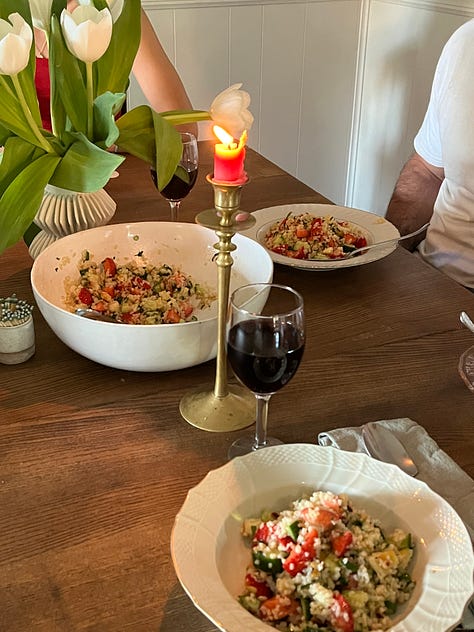

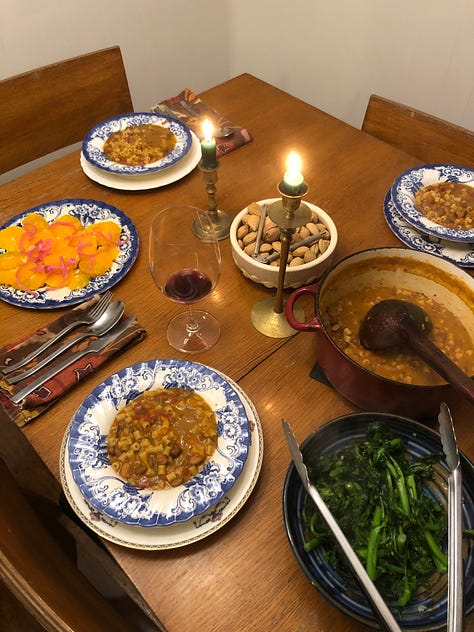
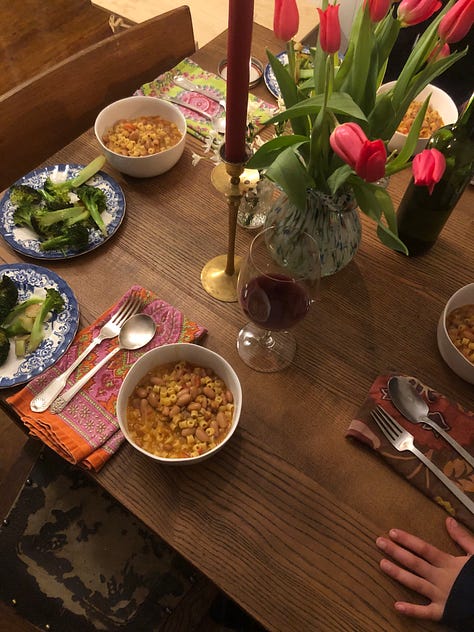
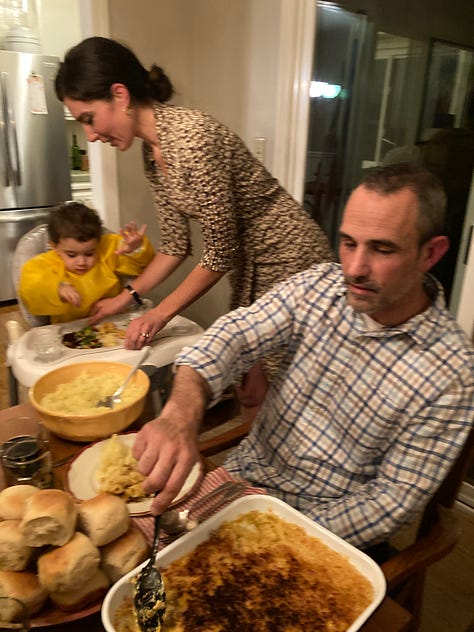

Make it a priority. Set firm boundaries.
Family dinner is sacred- everyone in our house knows that we do not schedule things during dinner, that they have to be home at dinner time, and that everyone contributes. It’s a commitment we make to each other to connect. It can also help to set a certain time for dinner so that everyone knows what to expect. I delayed sports for years because the practices and games are invariably during dinner time, and for us I felt it was more important to protect our evenings together. There is always time for extracurriculars later on when they get older as children naturally separate from their parents more and more. This also created plenty of time for unstructured play in the evenings, but that’s another story. With my older children now, we do have activities that are unavoidably during dinner sometimes, but I shift dinner time earlier or later to accommodate that.
We have a few rules at the table: no toys/books, no one starts eating until everyone’s been served, everyone sits until the last person is done eating, no food bargaining (for ex: “one more bite”, if you eat this, you will get this, if you clear your plate you get dessert…) and you need to ask to be excused from the table if you must get up. Of course, plus the usual no chewing with your mouth open, elbows off the table, napkin in your lap, etc. Everyone eats whatever’s on the table that night, and children decide how much they eat. If there’s a food someone hasn’t tried or doesn’t want to eat, they must try one bite before deciding whether to eat it or not. Set the rules/boundaries that align with your own family’s values and enforce them kindly but firmly. Also, keep in mind that just as in life, dinner will not always be beautiful and positive- there will be grumpy moods, tantrums, tears, food on the floor, someone refusing to eat something- it’s ok, it will pass.
Minimize disruptions.
Make sure everything you need is on the table, to avoid having to keep getting up to get missing things- I always put the salt cellar on the table for this reason, a pitcher of water is also a good idea. Silence phones and put them out of sight. When children are little, it helps to cue them to use the bathroom (and wash hands!) right before the meal, so that getting up during the meal is avoided.
Make it simple, make it fun.
The food need not be fancy or complicated. Sometimes you just need to get dinner on the table and it’s a weird assortment of whatever’s to hand, sometimes it’s takeout, but it still can be served at the table on a plate, sitting down together. It can really help to have a meal plan in place for the week to facilitate getting nourishing food on the table with regularity. It could be as simple as saying, on Monday we will have soup, on Thursday we will have pasta, on Friday pizza. To make dinners smoother, if you have a picky kid, there should be something on the table everyone will eat, and it’s ok if that’s all they eat. If you switch off cooking with someone else, talk on the weekend about who will make which dinners the following week.
Dinner should be enjoyable, and children (and everyone) should feel that they are really listened to- to feel seen and heard is such a gift. It is not a time for bringing up topics of conflict or criticism. Everyone should get a chance to talk, whether young or old. Ask about everyone’s day (if children are giving one word answers it can help to be specific- what did you do at recess today, what book are you reading in English, how are your friends etc), relate both highs and lows of the day, and perhaps have some silly or fun conversation starters to use. Children also really love to hear stories of when you were a child.
Make it special.
In our house, we light a candle, often have fresh flowers on the table, use cloth napkins, and play music softly in the background. This signals the reverence we have for mealtime, and brings beauty to it. Older children love to light the candle, and younger children can blow it out at the end of the meal. The candle not only adds ambience and beauty, but it signals to children the beginning and end of the meal and creates space for quiet, gratitude and peace as it is calming. As an adult, you can make sure to model your very best manners for your child to observe and absorb.
Share in the work:
Have your children, partner, roomate, whoever help with the preparation of the food. It’s fun, it lightens the load of the cook, and it makes the food more meaningful (and likely to be eaten) when you sit down to eat. Even young children can set the table and often are thrilled to be allowed the responsibility to do so. After the meal, make it a habit for everyone to bring their plates to the sink and to share in the cleanup. In our house, my 11 year old clears the table and wipes it down, takes out the trash and recycle, and vacuums/sweeps under the table. My 15 year old loads the dishwasher with the plates and silverware and glasses, then wipes down the outside of the fridge, the stovetop, and countertops. My husband and I trade off on who washes the dishes/puts away food/scrubs the sink out, and who takes the 3 year old to bathe him and begin his nighttime routine.
If you have very young children, they can still help with the cleanup even as a young toddler. Cleaning up together instills good habits and love and respect for our spaces. It can be as simple as offering a spray bottle of soapy water and a rag to wipe the table, or a broom to sweep, or a stool next to you at the sink — inviting them to work alongside you in the kitchen while you finish up the dishes. They can learn at a very young age, too, to carry their plate or cup to the table and hand it to you at the sink or put it in the dishwasher.
I hope this inspires you to implement more family dinners if you don’t already have this ritual in your life. I know life gets busy, and sometimes things have to give, but I think the benefits are vast. We lose so much when we lose communal gatherings, especially in a world that already values the individual over the group. Leaving you with this beautiful poem, one of my all time favorites. xx A
Perhaps the World Ends Here
The world begins at a kitchen table. No matter what, we must eat to live.
The gifts of earth are brought and prepared, set on the table. So it has been since creation, and it will go on.
We chase chickens or dogs away from it. Babies teethe at the corners. They scrape their knees under it.
It is here that children are given instructions on what it means to be human. We make men at it, we make women.
At this table we gossip, recall enemies and the ghosts of lovers.
Our dreams drink coffee with us as they put their arms around our children. They laugh with us at our poor falling-down selves and as we put ourselves back together once again at the table.
This table has been a house in the rain, an umbrella in the sun.
Wars have begun and ended at this table. It is a place to hide in the shadow of terror. A place to celebrate the terrible victory.
We have given birth on this table, and have prepared our parents for burial here.
At this table we sing with joy, with sorrow. We pray of suffering and remorse. We give thanks.
Perhaps the world will end at the kitchen table, while we are laughing and crying, eating of the last sweet bite.
from The Woman Who Fell From the Sky by Joy Harjo, W. W. Norton and Company Inc., 1994



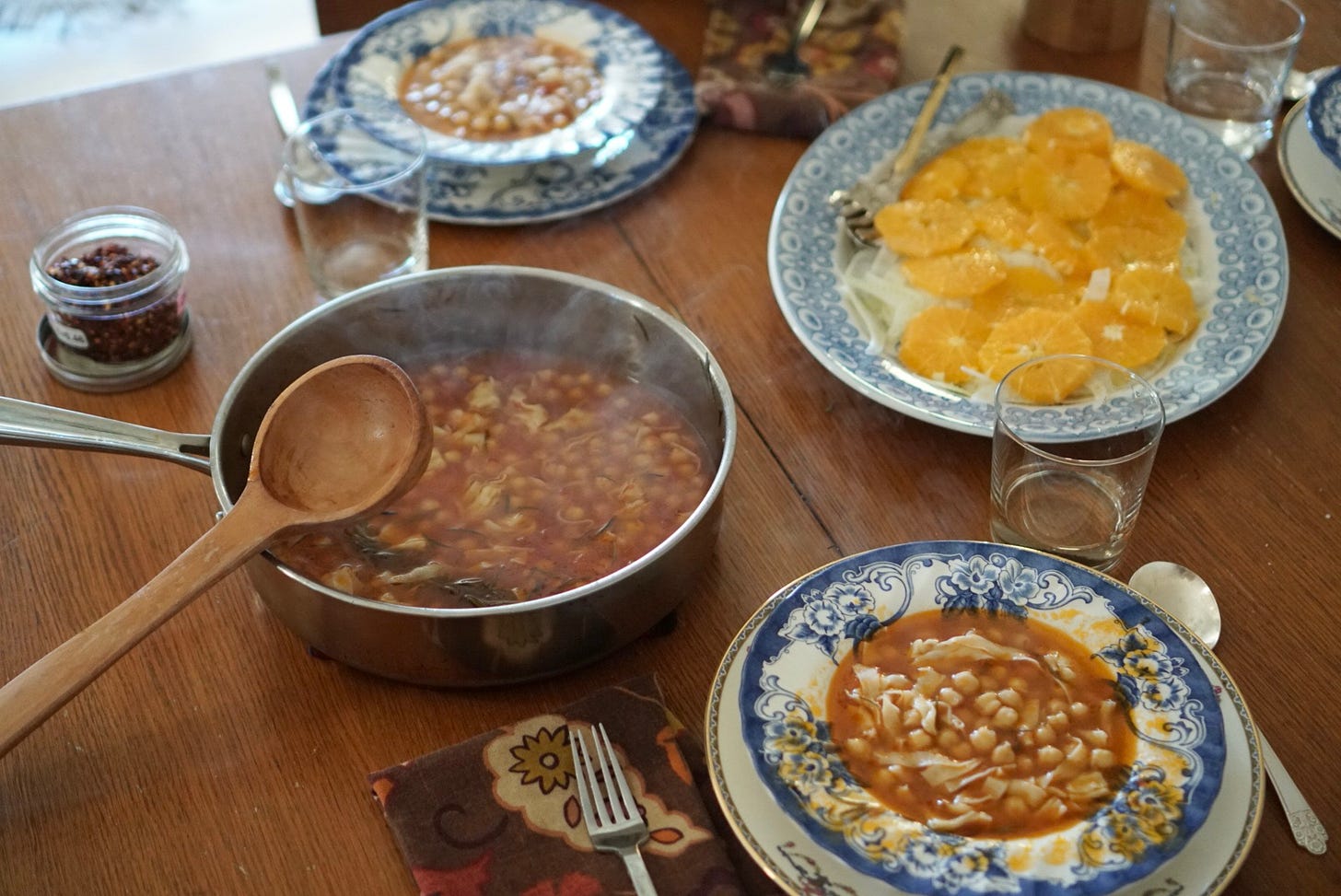
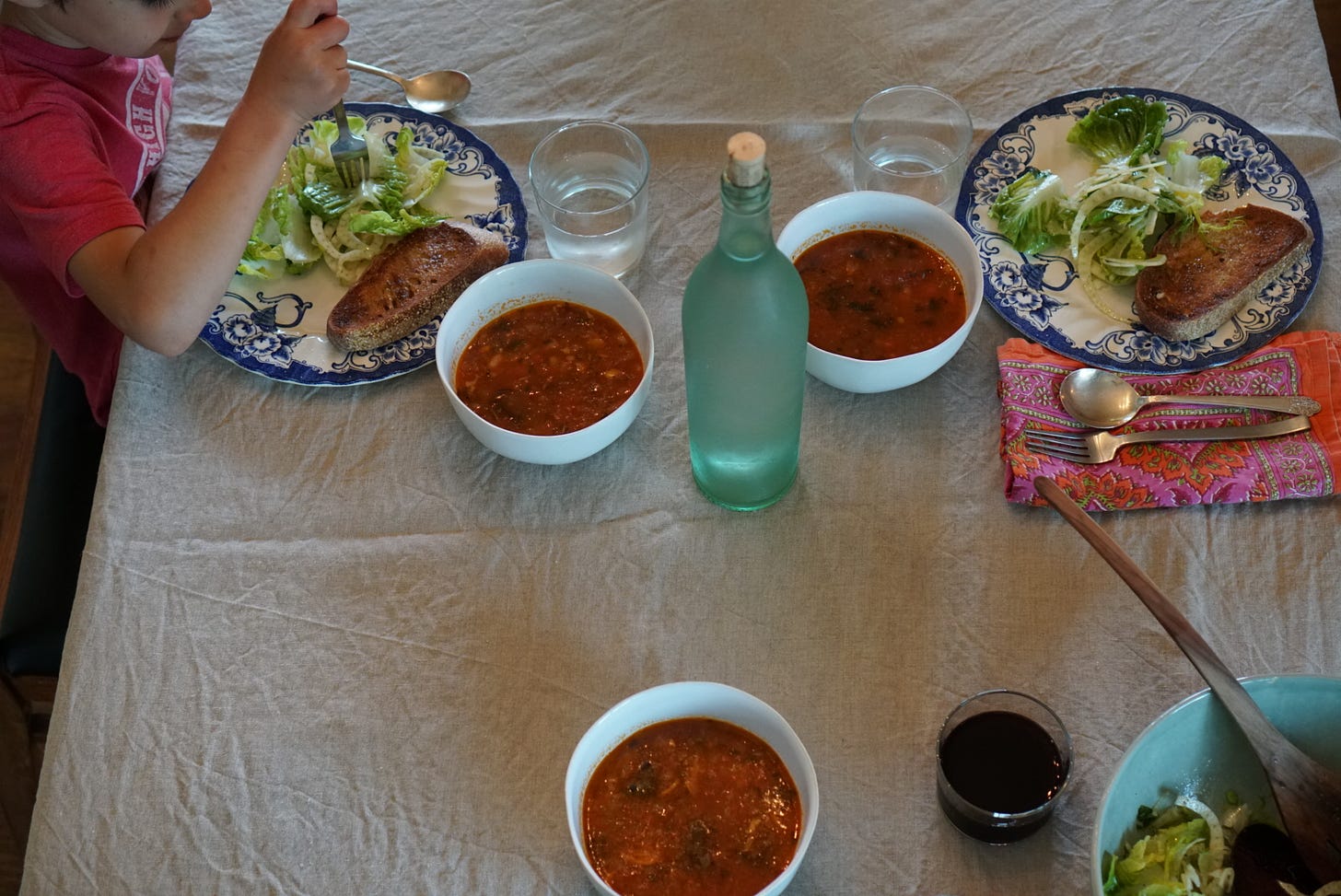
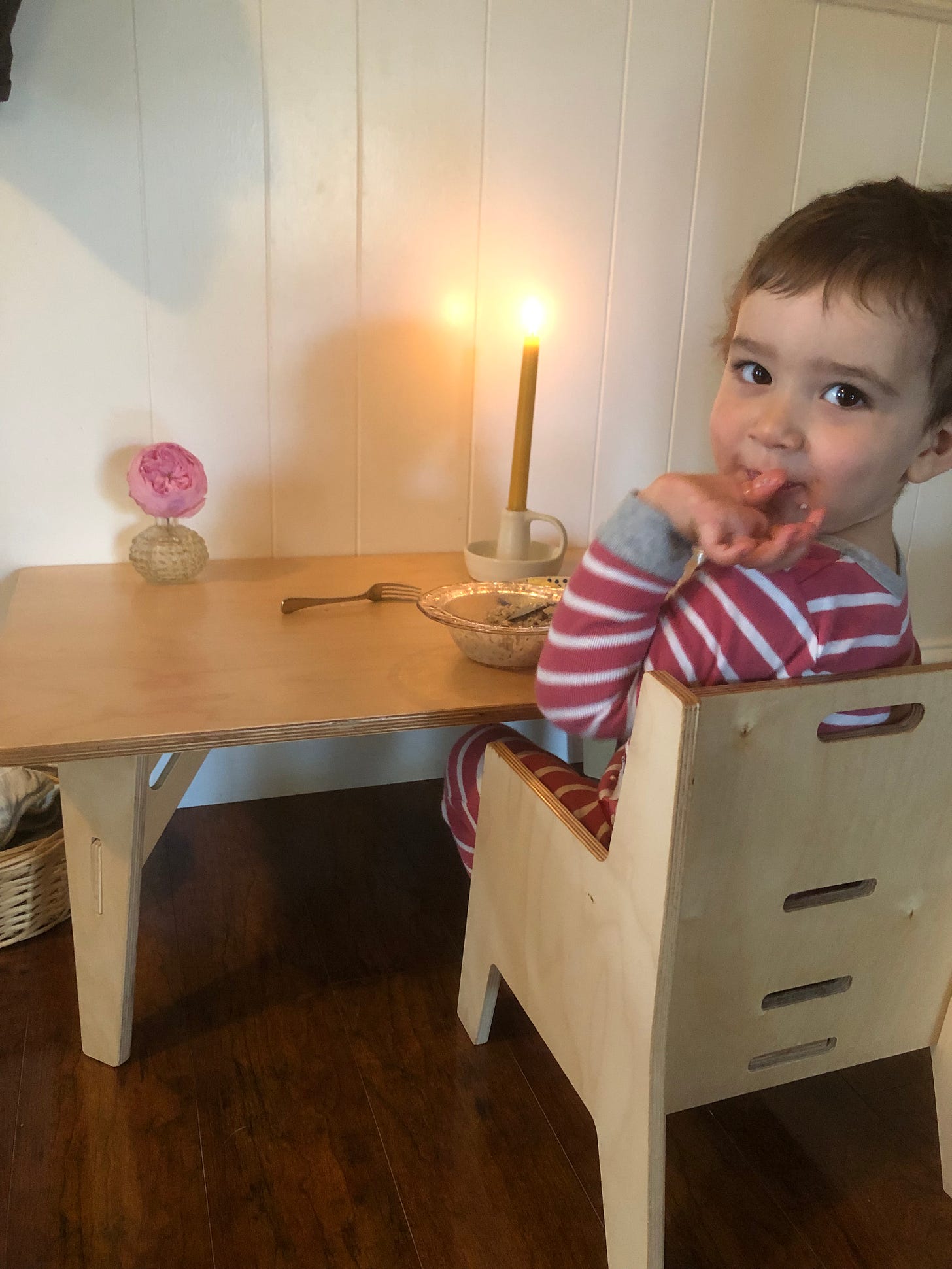
Love this! And one of my favorite poems. xx
I also love the sanctity of family dinner. such a special time of day to connect and be present with eachother. really enjoyed this post, thank you!